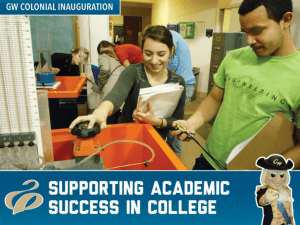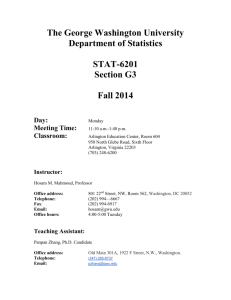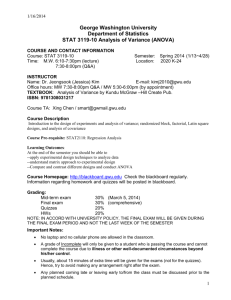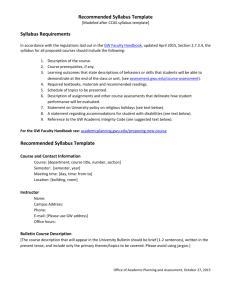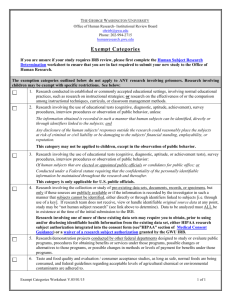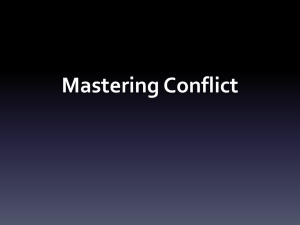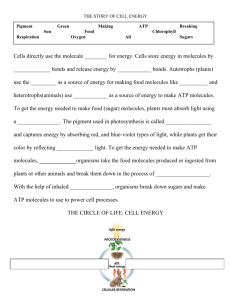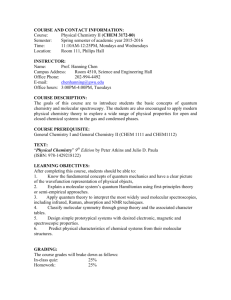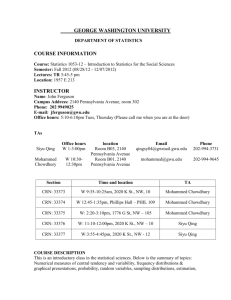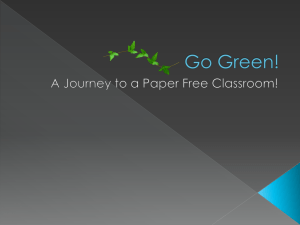Bisc 1111
advertisement
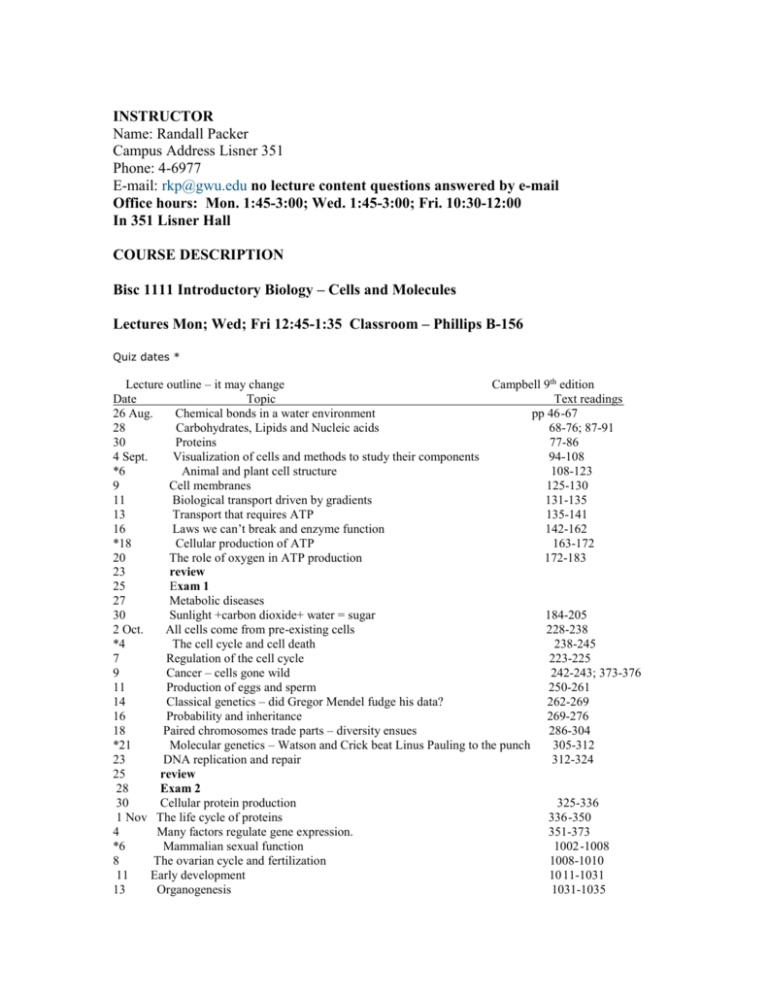
INSTRUCTOR Name: Randall Packer Campus Address Lisner 351 Phone: 4-6977 E-mail: rkp@gwu.edu no lecture content questions answered by e-mail Office hours: Mon. 1:45-3:00; Wed. 1:45-3:00; Fri. 10:30-12:00 In 351 Lisner Hall COURSE DESCRIPTION Bisc 1111 Introductory Biology – Cells and Molecules Lectures Mon; Wed; Fri 12:45-1:35 Classroom – Phillips B-156 Quiz dates * Lecture outline – it may change Campbell 9th edition Date Topic Text readings 26 Aug. Chemical bonds in a water environment pp 46-67 28 Carbohydrates, Lipids and Nucleic acids 68-76; 87-91 30 Proteins 77-86 4 Sept. Visualization of cells and methods to study their components 94-108 *6 Animal and plant cell structure 108-123 9 Cell membranes 125-130 11 Biological transport driven by gradients 131-135 13 Transport that requires ATP 135-141 16 Laws we can’t break and enzyme function 142-162 *18 Cellular production of ATP 163-172 20 The role of oxygen in ATP production 172-183 23 review 25 Exam 1 27 Metabolic diseases 30 Sunlight +carbon dioxide+ water = sugar 184-205 2 Oct. All cells come from pre-existing cells 228-238 *4 The cell cycle and cell death 238-245 7 Regulation of the cell cycle 223-225 9 Cancer – cells gone wild 242-243; 373-376 11 Production of eggs and sperm 250-261 14 Classical genetics – did Gregor Mendel fudge his data? 262-269 16 Probability and inheritance 269-276 18 Paired chromosomes trade parts – diversity ensues 286-304 *21 Molecular genetics – Watson and Crick beat Linus Pauling to the punch 305-312 23 DNA replication and repair 312-324 25 review 28 Exam 2 30 Cellular protein production 325-336 1 Nov The life cycle of proteins 336-350 4 Many factors regulate gene expression. 351-373 *6 Mammalian sexual function 1002 -1008 8 The ovarian cycle and fertilization 1008-1010 11 Early development 10 11-1031 13 Organogenesis 1031-1035 15 18 *20 22 25 2 Dec. 4 6 Developmental regulatory factors Developmental diseases Innate immunity How we make antibodies to a million different antigens Antibodies are almost always your friend Killer cells TBA Review 1035-1043 929-935 935-946 946-952 Note: My Lab/Mastering, 9th ed. (an on-line tutorial), is required. My Lab/Mastering and the e-text are included with the book sold in the GW Bookstore (ISBN 13:9780321847010). It can also be purchased separately from the book, with (ISBN: 13:9780321865045) or without (ISBN: 13:9780321865069) the e-text, from the GW Bookstore or BlackBoard (“Pearson’s MyLab/Mastering” icon under “Tools”). The ISBN# for the book alone (no Mastering or e-text) is 13:9780321558237 (or 0321558235). LEARNING OUTCOMES: Objectives – Students will be able to Learn biological concepts from lectures, reading, online tutorials and/or discussions with peers. Work with a team to solve problems and analyze the concepts. Articulate their understanding and analyses of biological systems in speaking and writing. Use basic lab techniques to design, execute, and computationally/statistically analyze experiments. As a result of completing this course, students will be able to: 1. Characterize polar vrs. non-polar molecules and to distinguish between carbohydrate, fat and protein molecules . 2. Be able to recognize and characterize the functions of major organelles and understand the functional characteristics of cell membranes (biological transport) and cell walls. 3. Students will understand the physical imperative of the 2nd law, understand how energy is stored in chemical bonds in photosynthesis and how that stored energy in bonds of food molecules is used in endergonic processes in cells; be able to discuss the inputs and products of glycolysis, fermentation , TCA cycle and oxidative phosphorylation. Understand how enzymes are produced, regulated and speed reactions. Students will begin to develop an understanding of intracellular regulatory networks that will be developed throughout the remainder of the course. 4. Be able to outline the stages and regulation in different tissues. 5. Students will be able to describe gamete formation and the selective advantages of sexual reproduction, solve problems of inheritance in classical genetics, understand the functions of protein coding and non-protein coding DNA regions, describe the various roles of RNA as well as generation of gene variants by recombination. 6. Students will be able to outline the role of growth factors in vertebrate development and understand the development of the vertebrate nervous system. 7. Students will be able to distinguish between the innate and adaptive immune systems and explain the role of the major cellular effectors of immunity as well as the network of cell-to-cell communication that regulates immune responses. Laboratory Skills. Students will work in teams to investigate some or all of these: i) Analysis of Proteins, ii) Biological Transport, iii) ELISA, iv) Enzyme Kinetics, v) Mitosis, vi) Bacterial Transformation, vii) PCR, viii) Electrophoresis, ix) Drosophila Genetics, x) Sea Urchin Development, xi) Bioinformatics/Computational Biology, xii) Searching and analyzing Biological literature. GRADING The lecture will count for 300 points and the lab 200 points. The 300 points in lecture will be determined as follows: Two 60 point exams during the semester and a 100 point final. The final exam is cumulative Six graded homework assignments –8 points each. There will be at least 6 assigned homeworks. I will count your top 5 scores. Homework will not be accepted late for any reason. 6 quizzes 8 points each – top 5 grades count – no make-ups given for any reason Quizzes will be given at the beginning of the period. If you arrive late you will have no extra time. If you arrive after the conclusion of the quiz you may not begin it. NOTE: IN ACCORD WITH UNIVERSITY POLICY, THE FINAL EXAM WILL BE GIVEN DURING THE FINAL EXAM PERIOD AND NOT THE LAST WEEK OF THE SEMESTER CLASS POLICIES Attendance is not required but it is hard to do well in the course if you do not attend lecture. If you have a fever that you think is due to flu – please don’t come to lecture – Do the readings, look over the lecture outline and get notes from a classmate – see me if you need help getting notes or if there are concepts you do not understand. [Late work: Late work will not be accepted] [Make-up exams are allowed with a valid excuse and advance notification ] [Religious Holidays – if an exam is scheduled during one of your religious holidays, let me know at least one week in advance so that we can make arrangements] [NOTE: for university policies on teaching, see http://www.gwu.edu/~academic/Teaching/main.htm ] ACADEMIC INTEGRITY I personally support the GW Code of Academic Integrity. It states:: “Academic dishonesty is defined as cheating of any kind, including misrepresenting one's own work, taking credit for the work of others without crediting them and without appropriate authorization, and the fabrication of information.” For the remainder of the code, see: http://www.gwu.edu/~ntegrity/code.html SUPPORT FOR STUDENTS OUTSIDE THE CLASSROOM DISABILITY SUPPORT SERVICES (DSS) Any student who may need an accommodation based on the potential impact of a disability should contact the Disability Support Services office at 202-994-8250 in the Marvin Center, Suite 242, to establish eligibility and to coordinate reasonable accommodations. For additional information please refer to: http://gwired.gwu.edu/dss/ UNIVERSITY COUNSELING CENTER (UCC) 202-994-5300 The University Counseling Center (UCC) offers 24/7 assistance and referral to address students' personal, social, career, and study skills problems. Services for students include: - crisis and emergency mental health consultations - confidential assessment, counseling services (individual and small group), and referrals http://gwired.gwu.edu/counsel/CounselingServices/AcademicSupportServices SECURITY In the case of an emergency, if at all possible, the class should shelter in place. If the building that the class is in is affected, follow the evacuation procedures for the building. After evacuation, seek shelter at a predetermined rendezvous location.
